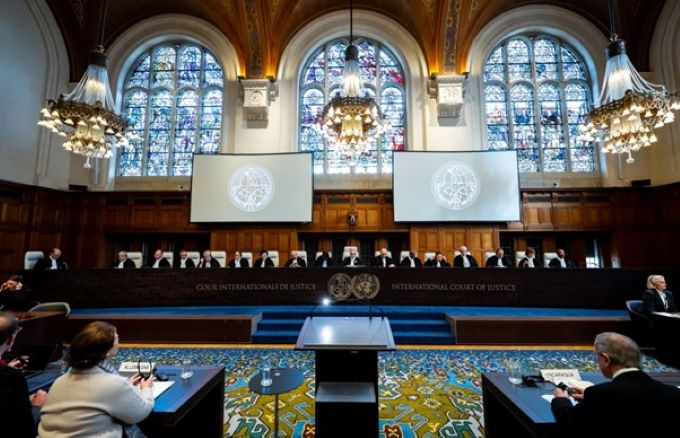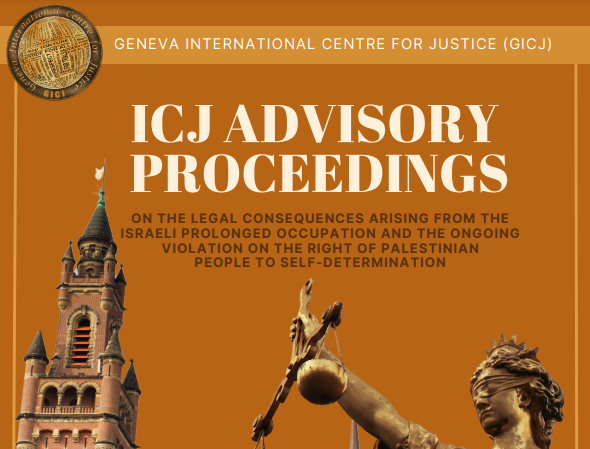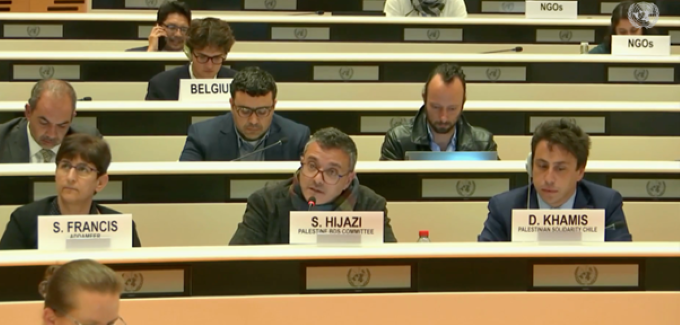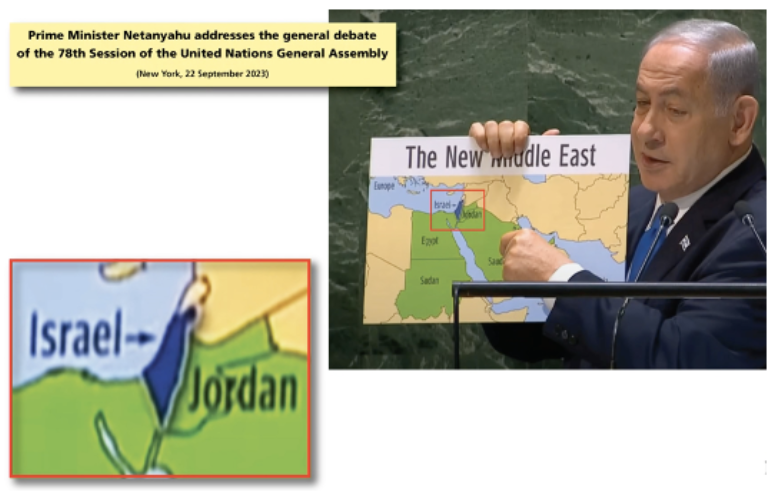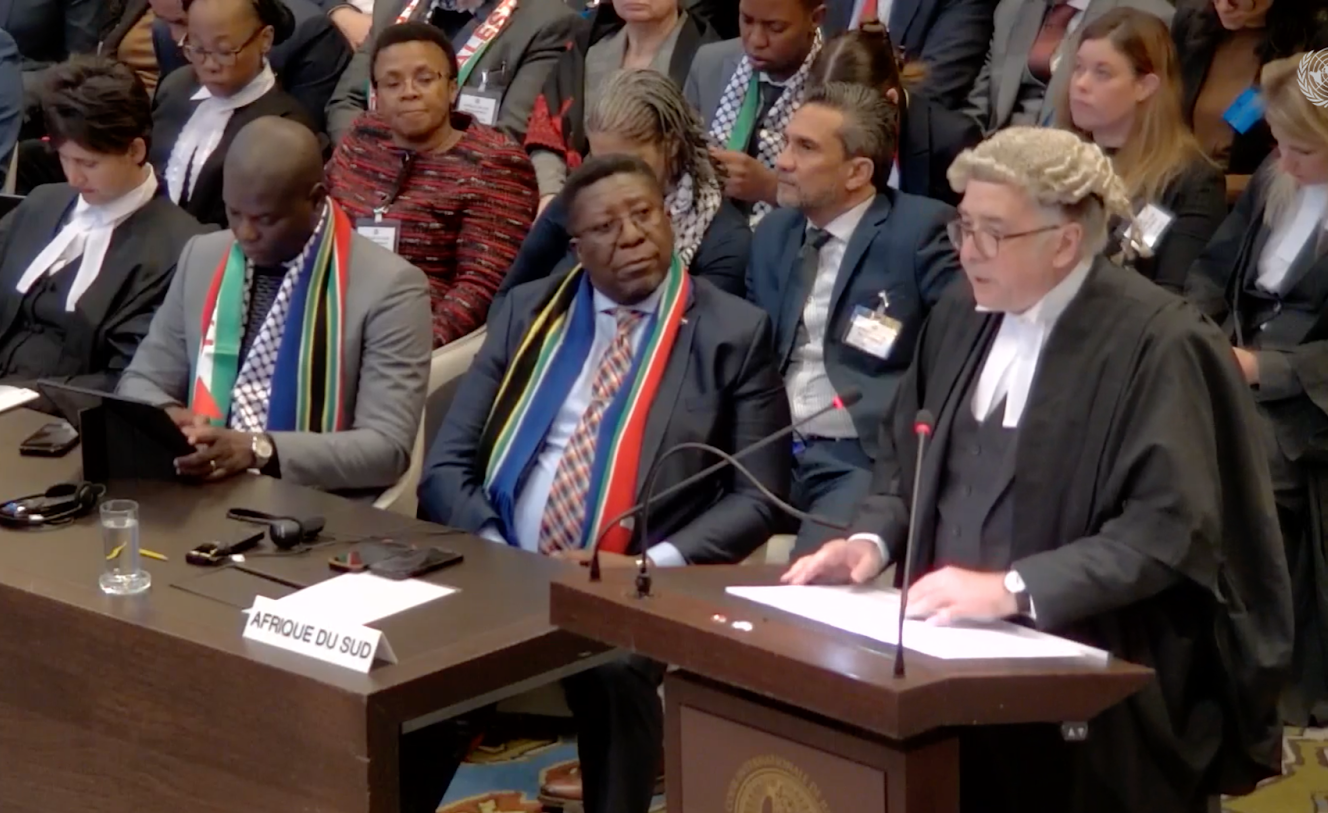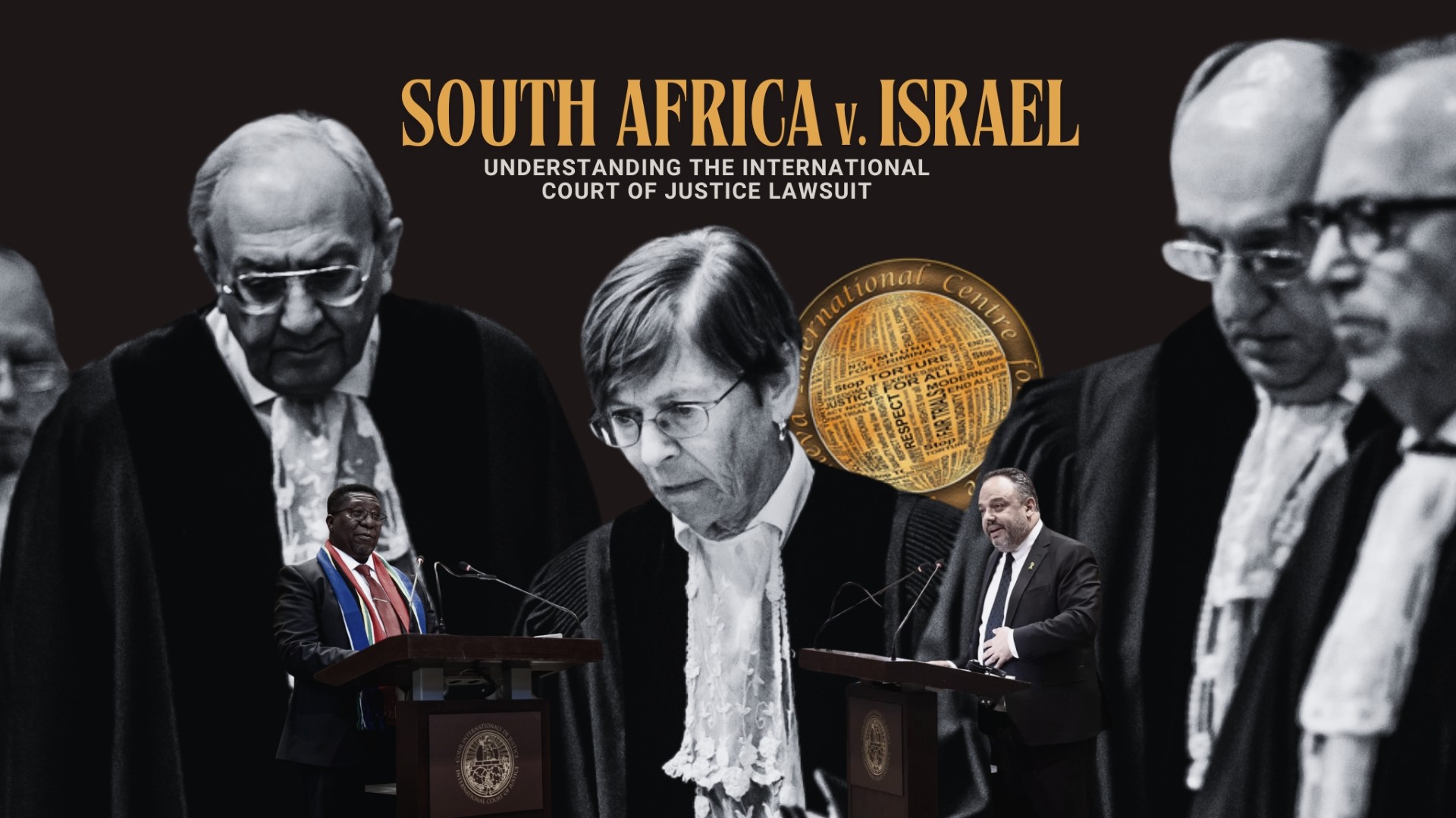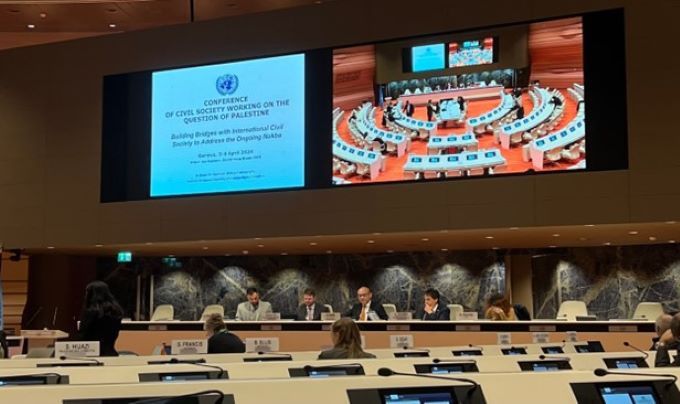
By Héloïse Carel /GICJ
The Committee on the Exercise of the Inalienable Rights of the Palestinian People, established in 1975, has a twofold mission: to facilitate constructive dialogue concerning Palestine and to galvanise global support and commitment. In this regard, the Committee held a two-day long conference in the United Nations Office in Geneva on the 3rd and 4th of April 2024, with civil society working on the question of Palestine Building Bridges with the International Civil Society to Address the Ongoing Nakba.
The Palestinian struggle for justice and liberation has garnered prompting discussions on effective state and civil society actions to hold perpetrators accountable and support the Palestinian cause. During the first panel of the second day, various speakers including Mr. Ahmad Abuzneid, Diego Khamis, and activist Rula Shadeed, shed light on the multifaceted dimensions of the issue, the Palestinian diaspora, the common goal of the global majority, and the urgency for meaningful interventions.
State Actions on Accountability: Discussing Best Practices
Mr. Ahmad Abuzneid as the Executive Director of the US Campaign for Palestinian Rights underscored the growing demand among the American people for a ceasefire and justice for Palestinians. The United States has been the most prominent defender of Israel, but internally – public opinion is shifting. This work and awareness has been done through civil disobedience, protest, and campaigning. He highlighted the common narrative in mainstream western media and how it has been debunked by social media campaigns that amplify Palestinian voices and shed light on their struggles, including the war on Gaza and the prolonged occupation. This shift in perspective signifies a crucial step towards raising awareness and fostering solidarity. While unity exists, divisions persist, exemplified by entities like AIPAC, a pro-Israel political action committee advocating for Israeli interests in the U.S. Additionally, certain liberal Zionist organizations are also perceived as detrimental to the cause.
Mr. Diego Khamis, representing the Palestinian community in Chile, emphasised the global significance of Chile being home to the largest Palestinian diaspora outside of Palestine. He discussed the impact of Israeli actions on Chilean nationals, including the ban on Chilean-Palestinians from entering East Jerusalem, as well as other measures taken by the Israeli government. Chile's historical support for Palestine aside, the nation recognized the inherent injustice experienced by Palestinians and human rights defenders. This acknowledgment went beyond religious or political perspectives, highlighting a broader understanding of the issue.
Furthermore, he expressed that civil society has worked in a transcendental manner, stating that “Palestine is a moral duty”. This notion has worked effectively in Chile because it is neither a right or left political matter, nor a religious debate. Therefore, when there are shifts in political position, the cause of Palestine could be affected; but in the case of Chile, it continues to hold strong support from the bicameral system, the presidency, and civil society. The political sector, and the oppositions in Chile, have shown support to the Palestinian society independently of their ideologies and political parties – contrary to the phenomena that can be observed in the United States.
Activist Rula Shadeed spoke on the hypocrisy of states claiming to uphold Western values while supporting colonisation and violating fundamental freedoms, indicating that the Palestinian plight transcends borders, affecting liberties and sparking solidarity movements worldwide. This global response highlights the interconnectedness of struggles for freedom and underscores the imperative for collective action. When it comes to the question of Palestine, it is not only about recognizing Palestine as a state but to work on ending colonisation, “even if we recognize Palestine, it will not change the status quo of Palestine; it will not end colonisation” she stated. Ms. Shadeed believes that it is crucial to recognize Palestine as a state, and call for a ceasefire, but the work must, and will, continue. She implored everyone to not lose focus, and continue supporting the Palestinian society.
Lastly, she focused on the effective state actions on accountability that have encompassed various measures, as demonstrated by recent developments. Some of these actions include Belgium's suspension of arms sales to Israel and Ireland's financial commitment, which signifies concrete steps towards holding perpetrators accountable and supporting Palestinian communities. Additionally, France and the UK's ban on settlers and Nicaragua's participation in legal proceedings reflect growing international condemnation of Israeli policies. Initiatives in Europe categorise complicit companies, scrutinise state officials supporting genocide, and address the relationship between countries and perpetrators. Brazil's vocal condemnation and the withdrawal of Israeli embassies in Latin America underscore the global momentum in addressing Palestinian grievances and advocating for justice. State actions on accountability play a pivotal role in addressing the Palestinian struggle for justice and liberation. By amplifying Palestinian voices, holding perpetrators accountable, and fostering international solidarity, states can contribute to a more just and equitable future for Palestine and its people.
AI Responsibility for Attacks
The use of Artificial Intelligence (AI) in conflict zones, such as Gaza, raises critical ethical and legal questions that demand urgent attention. Discussions at the United Nations have long revolved around the potential use of AI in addressing war crimes and genocide, highlighting the need for robust legislation to regulate its use. However, the rise of private actors in the war sector complicates matters, as these tools are often developed and supplied by private companies. This underscores the importance of accountability mechanisms, including prosecuting corporations at the ICC for their involvement in perpetuating conflicts and human rights abuses. With AI’s growth, it becomes increasingly crucial to consider the impact it has on international relations, with some viewing it as a tool for building relationships with other countries. Ossman Noor, Co-Director of the Civilian Agenda – an advocacy organisation dedicated to shaping public opinion on pressing policy issues, emphasises the necessity of systemic reform to address these challenges effectively. Despite Palestine's small geographical size, its cause serves as a crucial litmus test for evaluating the effectiveness and accountability of our available tools, consequently prompting in-depth discussions and scholarly papers examining accountability and the ethical implications of AI. Moreover, navigating the complexities of holding AI accountable poses a unique challenge, especially when AI itself is responsible for AI. As the international community grapples with the need for new international laws, there is recognition that the UN may not be inherently anti-capitalistic, but it cannot condone profiting from bloodshed. Thus, there is a pressing need for a comprehensive framework that ensures the responsible and ethical use of AI in conflict zones while upholding principles of accountability and justice.
Ensuring Compliance with International Mechanisms After the ICJ Rulings
During the second panel of the second day, several distinguished speakers addressed the audience. Together, they discussed strategies to ensure compliance with international mechanisms following recent rulings by the International Court of Justice (ICJ). The conference, aimed at fostering dialogue and collaboration among international civil society organisations to address the ongoing Nakba, emphasised the importance of upholding international law and promoting justice for the Palestinian people.
During his remarks at the plenary session on "Ensuring Compliance with International Mechanisms," Mr. Thembela Ngculu, Counsellor at the South Africa Permanent Mission in Geneva, underscored the imperative of holding Israel accountable for its actions in compliance with International Court of Justice (ICJ) provisions. He highlighted the urgency of implementing additional measures outlined by the ICJ on 6th March, emphasising that all parties to the genocide convention must take decisive action. Mr. Ngculu expressed concern over Israel's ongoing violations despite the latest ICJ orders, stressing that South Africa's case at the ICJ played a pivotal role in the adoption of the resolution by the Security Council on 26th March. He reiterated that the only viable solution to end the suffering is ending Israel's occupation.
Mr. Ahmed Abofoul, a legal expert representing Al-Haq, delivered a comprehensive critique of the Israeli occupation, contextualising it within historical and legal frameworks. He began by highlighting the entrenched suffering of Palestinians over 75 years of illegal military occupation, emphasising the overcrowded living conditions in Gaza and the enduring impact of the 1948 Nakba. Abofoul condemned the selective application of international law by Western states, particularly concerning Israel's violations, and criticised the concept of "victor's justice" that allows impunity for powerful nations. He articulated the ideological roots of Zionism as a form of European imperialism racism and underscored Israel's dehumanisation of Palestinians, drawing parallels with colonial oppression. Abofoul outlined ongoing legal efforts by civil society to challenge Western complicity in arming and supporting Israel, citing cases in the US, UK, Canada, and other countries where citizens are holding their governments accountable. He called for global solidarity in confronting apartheid and genocide, urging the reconstitution of a UN special committee on apartheid and demanding decisive action from countries like the US, UK, and Germany to end their support for Israel and uphold international law.
Mr. Saleh Hijazi, the Apartheid-Free Policy Coordinator for the Palestine BDS Committee, addressed the conference with a focus on the global non-violent movement aimed at ending complicity with Israel's policies in the Occupied Palestinian Territories (OPT). He underscored the ongoing settler colonial apartheid endured by Palestinians for 76 years, emphasizing the continual impact of the Nakba and accusing Israel of perpetrating genocide, with the complicity of countries like the UK, US, and Germany. Hijazi referenced a potential ICJ case calling for an immediate arms embargo on Israel, echoing similar calls made by other speakers. He highlighted the importance of holding war criminals accountable, including by putting pressure on the International Criminal Court (ICC) to prosecute them, as obligated by the Genocide Convention. Hijazi pointed to the growing global anti-racism movement, particularly through the BDS campaign, as evidence of increasing awareness and activism surrounding Palestinian rights. He outlined several measures taken by countries and institutions to divest from and sanction Israel, including severing diplomatic relations, suspending arms trade, and divesting from companies complicit in Israeli activities. Hijazi concluded by emphasising the need for international sanctions against Israel to uphold the integrity of the international legal system and ensure accountability for human rights violations.
Ms. Bethany Ellis, representing Watchlist as a Global Advocacy Advisor, focused on the analysis of Europe's refugee policy, particularly concerning children affected by armed conflict. Watchlist specialises in advocating for children's rights in conflict zones and has consistently monitored violations against children, as confirmed by UN reports. Ms. Ellis highlighted a concerning inconsistency in these reports, noting that despite documented violations by Israel, it has never been included in the UN Secretary-General's annual shame list. To address this gap, her NGO has been actively providing recommendations since 2017, with consistent calls for the Israeli government to be held accountable for killing and maiming children. Ellis emphasised the significance of being listed for violations against children, as it serves as a form of public shaming and encourages governments to fully implement recommendations to be removed from the list. She highlighted the efforts of Israel's allies to prevent its inclusion on the list and pointed out the alarming increase in child casualties in recent years, underscoring the urgent need for accountability and action to protect children in conflict zones. Failure to list relevant parties in 2023 would not only undermine the credibility of the UN but also have significant repercussions on the reputation of those responsible for protecting children's rights.
Geneva International Centre for Justice (GICJ) supports the efforts and advancements of international civil society, firmly urging the global community to take decisive action to halt the genocide in Gaza and ensure accountability and justice, viewing it as a moral imperative. Simultaneously, concerted efforts are essential to terminate the brutal occupation of the Palestinian territory. GICJ emphasises the pivotal role of civil society in spotlighting the Palestinian people's plight to the international community and ending the massacres. We stress the ongoing need for civil society to raise awareness and advocate for the upholding of international law by the international community.
Read more from GICJ:
#HRC55 #HumanRightsCouncil #UnitedNation #Ceasefire #Palestine #Genocide #CivilSociety #HumanRights #Justice #GenevaInternationalCenterForJustice #Geneva4Justice #GICJ




